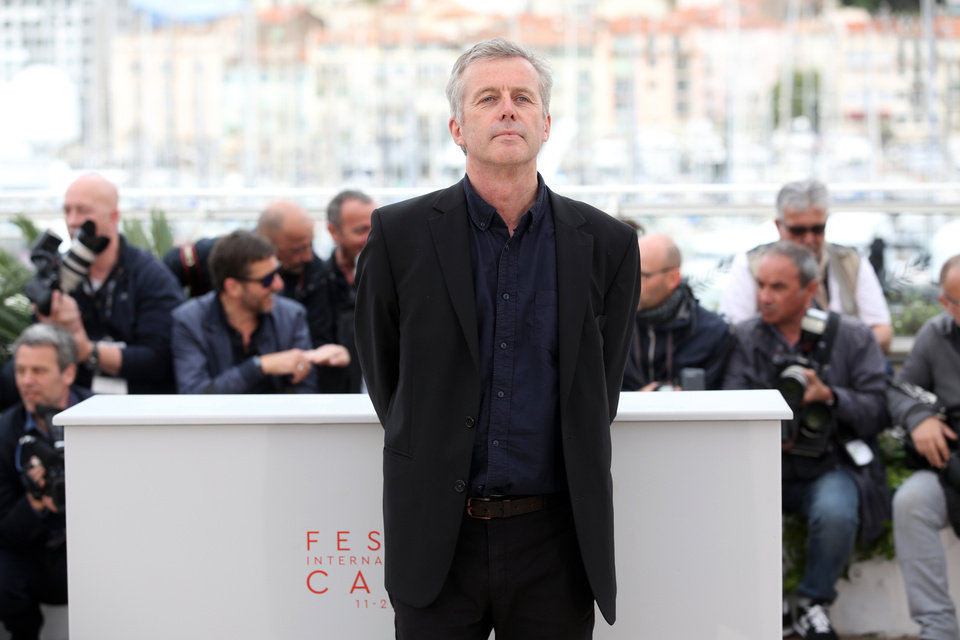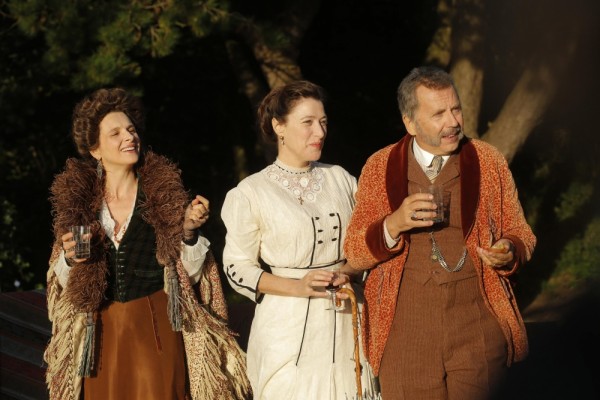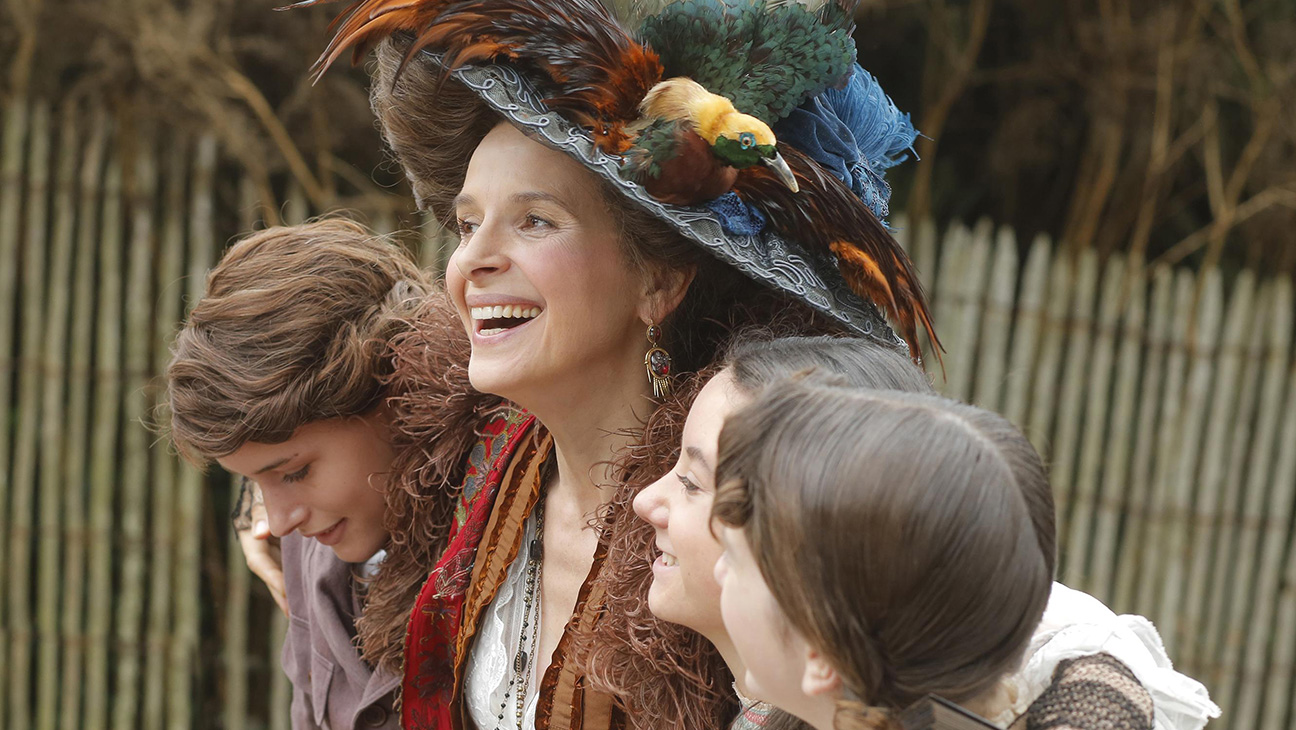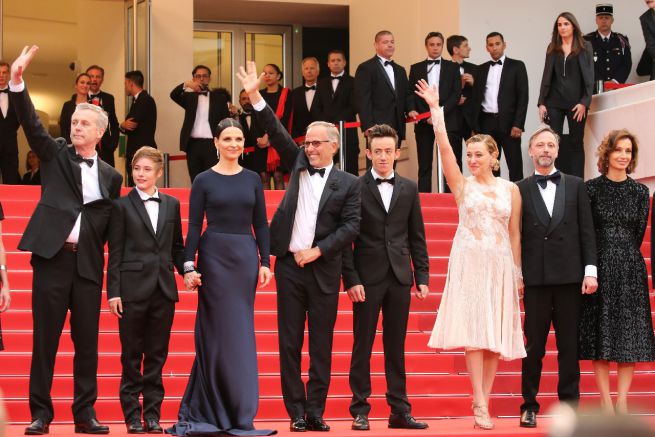BEAUTIFUL CREATURES: THE BRUNO DUMONT INTERVIEW.
 Thursday, May 26, 2016 at 3:15PM
Thursday, May 26, 2016 at 3:15PM The words 'Bruno Dumont' and ‘comedy’ are not often spoken in the same sentence. The French auteur’s films have largely been bleak, desperate studies of flawed characters struggling with tragic lives (The Life of Jesus, 1997; L'Humanite, 1999; Twentynine Palms, 2003; Flanders, 2006; Hadejwich, 2009; Camille Claudel 1915, 2013). But the 58 year-old plunges into the blackly ridiculous with Ma Loute (Slack Bay, in English territories), a Monty-Python-meets-Downtown-Abbey slice of magical surrealism in which he dissects the Gallic class divide as it existed in the summer of 1910. Set amidst the dunes and estuaries of his beloved northern French coastline, Dumont constructs a murder mystery that pits the vacationing upper class and clearly inbred Van Petegham clan (amongst them, Fabrice Luchini and a gloriously over-the-top Juliette Binoche) in conflict with local river-folk/cannibal peasants, The Bruforts (led by the titular teenager, played by Brandon Lavieville). “I always had comedy in me but I couldn’t find the right place to express it,” the director told SCREEN-SPACE (via an interpreter), while snacking on pistachios at the UniFrance tent as the Cannes Film Festival buzzed around us…

SCREEN-SPACE: Does this new willingness to explore comedy suggest a change in your own perspective of the world? Why a comedy now?
Dumont: When I finally settled upon the story of Ma Loute, commissioned the actors and set about scouting for locations, it was very liberating as it felt like I was about to fulfil a long-held desire. It ultimately fulfilled something that was lacking in my body of work, something (of which) I had not been fully aware. Comedy allowed me to more fully cover the spectrum of human experience that I had been striving to depict. Humour, (that) ability to find comedy in our lives, is something that had been lacking in my films. Also, my nature is to be adventurous, to try things that I have not done before, and that is not always easy in an industry that wants you to stick to what has been successful in the past. My next film is going to be a musical*, because I’ve never done that before.
 SCREEN-SPACE: Did you feel that you and ‘comedy’ were a natural fit?
SCREEN-SPACE: Did you feel that you and ‘comedy’ were a natural fit?
Dumont: I add irony to make the drama at the heart of my work explode. (Just) changing my approach I make it more comedic. I also think I bring my own reputation down a peg by trying some comedy, too. So it feels good to have found an outlet. (Pictured, right; l-r, Juliette Binoche, Valeria Bruni Tedeschi and Fabrice Luchini in La Moute)
SCREEN-SPACE: Setting the film at the turn of the century recalls the beginning of cinema; much of the physical comedy recalls the great pratfalls of silent era comedians. Why this period?
Dumont: Setting the film in this period helped me deflect the question of ‘realism’ that always dogs me. Being in the past, made it easier to look more like a metaphor. The year of 1910 represents a poetic metaphor; a time and a place that does not exist anymore, so contemporary audiences can define it as an allegory. The advantage in recreating that period is that everything is very extreme; the difference between the poor and the rich is very visible. It is already comic, in a way. Comedy works on simplification and here the contrast is already simple. I am always looking for a means by which to use distortion and exaggeration, and this time can be easily represented as ridiculous. The costumes, for instance, and how the wealthy behave in each other’s company appears extreme and ridiculous by current standards.
SCREEN-SPACE: You pitch much of the dialogue very high, demand some very broad, boisterous performances from your cast, none more so than the wonderful Juliette Binoche. The film represents a fresh tonality in your work.
 Dumont: Cinema is, by definition, something quite stiff. The frame and the mise en scene is something quite organised, necessitating structure. But once you have that structure, inside it you can let creativity and inspiration flow in. That’s what I did with the characters and with certain elements of the plot. I like having professional actors only if I can distort their performances. If I can’t there is no point taking them on. I don’t like them or need them for what they are. I would never take professional actors for the fisherman family, for example, because they would really piss me off, trying to ‘create’ fisherman characters. With the non-professionals, I don’t need to believe in their ‘normal’ acting, or in my asking them to do what they can’t do. I only take them if they are relevant to the subject matter, and here I had a bunch of crazy eccentrics. It was fun to work with them and to distort their performances. (Pictured, above; Juliette Binoche as Aude Van Petegham in La Moute).
Dumont: Cinema is, by definition, something quite stiff. The frame and the mise en scene is something quite organised, necessitating structure. But once you have that structure, inside it you can let creativity and inspiration flow in. That’s what I did with the characters and with certain elements of the plot. I like having professional actors only if I can distort their performances. If I can’t there is no point taking them on. I don’t like them or need them for what they are. I would never take professional actors for the fisherman family, for example, because they would really piss me off, trying to ‘create’ fisherman characters. With the non-professionals, I don’t need to believe in their ‘normal’ acting, or in my asking them to do what they can’t do. I only take them if they are relevant to the subject matter, and here I had a bunch of crazy eccentrics. It was fun to work with them and to distort their performances. (Pictured, above; Juliette Binoche as Aude Van Petegham in La Moute).
SCREEN-SPACE: You find the grotesque in both the pompous Petegham family and the brutal Brufort household. But you don’t draw a conclusion on whose existence represents the better life.
Dumont: Cinema is not inherently a moral field. Cinema has to be above the good and the bad otherwise there is no way to reflect upon it. The clash of social classes in my film is so exaggerated, so grotesque, so beyond the limits, it is hard to take very seriously. On one side they are cannibals, on the other they are an inbred family, totally nuts and impossible to relate to either. But within the spectrum that audiences bring to a film, the characters represent a mirror of sorts to our self. We all have this primitive, rural human being in us, and we possess the potential to be a totally stupid bourgeoisie. I wouldn’t be stupid enough to take one side over the other. (And) these are cinematic characters, clearly not real people.
 SCREEN-SPACE: Overnight, Variety published their review of Ma Loute and critic Peter Debruge called you ‘a grump’, the ‘misanthropic filmmaker’. How do you respond to that perception of you and your work?
SCREEN-SPACE: Overnight, Variety published their review of Ma Loute and critic Peter Debruge called you ‘a grump’, the ‘misanthropic filmmaker’. How do you respond to that perception of you and your work?
Dumont: (Pause) I am absolutely the opposite of that. I wonder how they can see misanthropy, when I’m glorifying my characters cinematically. Some people say the opposite (to Variety’s opinion), that this director is not misanthropic and is a lover of human nature, so the problem is not with me but with the reviewer. (This is) an immediate reaction to what they saw, and fails to see the metaphor; it bases their understanding of the film on a first impression. When I film a jerk, my aim is to elevate him to a saint, but they just see the vehicle, the first layer of characterisation. While some say the character of Ma Loute is ugly, some say he is a beauty; interpretation does not depend on me but depends on the viewer. I am not a philanthropist but nor am I a misanthrope. I remain neutral, in creating my characters with my actors. I hear it, like you do, but what can I do? Cinema has nothing to do with reality, it is a representation, so all these moral questions and talk of misanthropy are meaningless for me. (Pictured, above; Dumont with his cast at the Cannes Film Festival premiere of La Moute)
*‘Jeanette,’ a musical drama based on Charles Peguy’s play Le Mystere de la charite de Jeanne d’Arc, will be produced for French television and play theatrically overseas.
Australian distribution of Ma Loute (Slack Bay) will be via Sharmill Films, who acquired the title in Cannes; it will screen at the 2016 Melbourne International Film Festival.
 Cannes,
Cannes,  French Cinema,
French Cinema,  Juliette Binoche,
Juliette Binoche,  UniFrance
UniFrance 